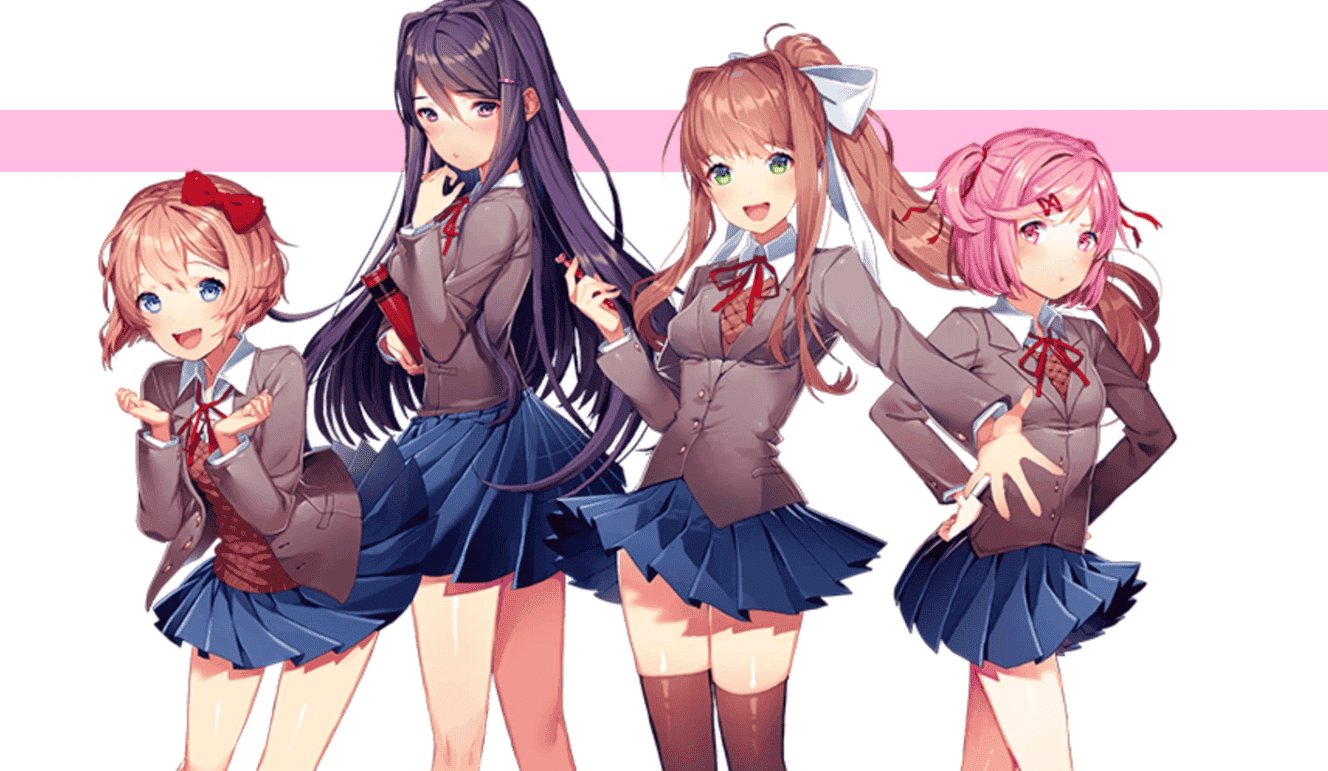
I played Doki Doki Literature Club on Steam in this week’s critical play. Doki Doki Literature Club is a visual novel developed by Team Salvato that adds a twist to the typical dating sim. The game centers around a male character that joins the Literature Club at his school. The player follows the story of this protagonist as he makes friends with the four girls in the club: Sayori, Monika, Yuri, and Natsuki. Playing the game as a feminist as defined in Shira Chess’s book “Play Like a Feminist” reveals a feminist narrative as well as feminist game mechanics.
First, Doki Doki Literature Club tells a feminist narrative. Chess defines a feminist narrative as “conversational, personal, and relays narratives that surpass the expectations we tend to have of those ushered in to and for patriarchal narratives.” Doki Doki Literature Club tells this feminist narrative by challenging typical patriarchal narratives in its commentary on gender roles and mental health. The four main female characters represent different archetypes commonly found in visual novels. However, the game’s critique lies in subverting these stereotypes and revealing the damaging consequences of objectification and the male gaze. For example, Sayori is your typical girl-next-door klutz who aims to make everyone happy. The game challenges this character trope by revealing Sayori’s inability to make herself happy and avoidance of burdening others with her issues. By deconstructing and challenging the traditional roles of women in games, the game aligns with challenging typical patriarchal narratives. Furthermore, Doki Doki Literature Club delves into the complexities of mental health, specifically depression and anxiety through its characters. The game uses its narrative to address the emotional struggles that individuals may face, particularly young women. By shedding light on mental health issues, the game encourages players to empathize with these experiences and understand the impact of societal pressures and expectations on mental well-being. The discussion of mental health and other serious topics such as suicide is not prevalent in patriarchal narratives. Thus, Doki Doki Literature Club’s commentary on gender roles and mental health tells a feminist narrative.

Moreover, Doki Doki Literature Club utilizes many feminist game mechanics. Chess adds that a feminist narrative also is a “narrative middle … not necessarily escalating towards a climactic conclusion, but existing within the pleasure of delay.” Doki Doki Literature Club exemplifies this quote as the gameplay revolves around getting to know the girls rather than a typical patriarchal climax like beating a final boss. Doki Doki Literature Club’s mechanic of following a narrative middle thus makes the game feminist. Additionally, Chess describes feminist game mechanics as having agency. Agency in games is the player’s ability to choose. Throughout the game, players are given choices to write poems for the next day in class. Choosing certain words for the poem results in different player storylines developing. Therefore, Doki Doki Literature Club has an agency game mechanic that makes the game feminist.
In conclusion, playing the game as a feminist as defined in Shira Chess’s book “Play Like a Feminist” reveals a feminist narrative through critiques on gender roles and mental health, as well as feminist game mechanics like narrative middle and agency.
Discussion Question
Does the setting of a dating sim distract from the feminist messaging present in Doki Doki Literature Club?



